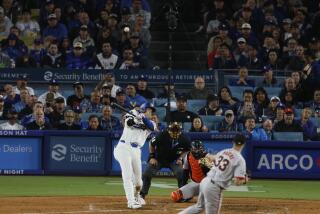The way the ball bounces
- Share via
The left fielder was the best hitter of his generation -- some said of all time -- but he didn’t exactly win any Mr. Congeniality awards. He was hostile to the media, indifferent at best toward the fans and fumed when his jaw-dropping batting records weren’t treated with the respect they deserved. Critics rightly pointed out that he never won a World Series ring, played subpar defense the last decade of his career and was the beneficiary of an inflationary offensive context.
Still, the baseball world eventually came around to forgive and even embrace Ted Williams. Will it do the same for Barry Bonds?
One of the beauties of sport is that there’s no way to predict how events will look in the rearview mirror. Three decades ago, Steve Garvey looked like a surefire Hall of Famer and a squeaky-clean citizen too. As recently as 1992, one could -- as Bonds did -- finish second in the league with 34 home runs; nowadays that total isn’t likely to crack the top 10. Did Bonds change? Certainly. But so did the game.
The next year, in fact, the National League expanded from 12 teams to 14. Every expansion in the history of baseball has boosted offense in the short-term, particularly the number of home runs hit by its top sluggers; Bonds boosted his homer total to a career-high 46. Roger Maris broke Babe Ruth’s single-season record in the expansion year of 1961, and Maris’ record fell to Mark McGwire in 1998, when the NL expanded yet again, to 16 teams. What’s more, the league’s stadiums are much smaller now than they were 15 years ago. With this and other changes, home runs became nearly twice as frequent within just eight years.
Did steroids and various hormones play a role in the homer splurge, including Bonds’? Possibly, but we don’t know to what extent, and definitely not with the numerical quasi-certainty displayed daily on the nation’s sports pages and talk-radio shows. Marginal slap-hitters and pitchers (including the guy who surrendered Bonds’ record-tying 755th home run) turn out to be the types disproportionately caught under baseball’s belated drug-testing rules -- rules that Bonds has never provably violated. Implicit in much of the criticism is the notion that steroids can on their own create useful musculature and help turn 90-mph sliders into home runs, instead of merely allowing athletes to recover more quickly from weightlifting sessions of the kind Bonds is famous for.
No amount of contextualizing can alter the fact that Barry Bonds, from ages 36 to 39 -- a time when most great careers are winding down -- performed at a higher level than the game had ever seen. We may yet discover evidence stronger than journalistic hearsay that he did so by cheating and breaking the law. And we may also change the way we look at those facts, much as fans think much differently today about McGwire’s admitted supplement use than they did in 1998. By then, the home run record is likely to have been broken anew. The pastime may be national, but it’s far from being static.
More to Read
Go beyond the scoreboard
Get the latest on L.A.'s teams in the daily Sports Report newsletter.
You may occasionally receive promotional content from the Los Angeles Times.










